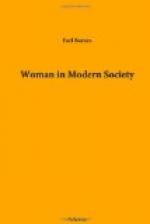To read some of the most popular literature on this subject one might imagine that women had all deserted home and fireside, babies and baking, and were lined up, struggling fiercely to deposit certain printed slips, called votes or ballots, dealing with esoteric mysteries understood only by men like Mr. Bryan or Mr. Roosevelt, in ballot-boxes. These receptacles are supposed to be behind, or very near, lawless saloons, where gangs of hoodlums are waiting to assault the bearers of these mysterious tickets. Thus Miss Seawell writes in the Atlantic Monthly for September, 1910: “The trouble would begin with the mere attempt of women to deposit their ballots. A dozen ruffians at a single polling-place would prevent a single woman from depositing a single vote. There can be no doubt that this means would be used by the rougher element and that the polls would become a scene of preordained riot and disorder.” Of course, such statements could not appear in a leading magazine, in a land where women have been voting quietly for many years, were it not for the perversity of the words which the author tries to use, but which really use her. In other periodicals, equally respectable, one learns that women, goaded on by the intolerable political tyranny of men, have agreed as one soul to advance, with ballots in their hands, and sweep graft and greed, drink and all other human wrongs, into the sea of oblivion forever. Of course, this is nonsense, or worse, and in this chapter I should like to turn away from this warfare, leaving even the battered and prejudiced-soaked words alone, as much as may be possible, and simply ask: What is political life, not as defined in books, but as actually lived by a self-respecting farmer or merchant of our acquaintance? What qualities does political life presuppose in a participant? How does its use affect him? What does it enable him to accomplish? What is the relation of a woman—not some militant or unsexed ogre, nor a female breeding animal in a harem, but our own sisters, wives and daughters as they really are—what is their relation to this mysterious process?
If one approaches the political life of our modern democracies in this simple spirit of inquiry it would seem that the first requisite for participation is the ability to form sound judgments concerning political matters; and all matters are now becoming political which affect the welfare of the community. Certainly the citizen cannot devise political machinery nor select candidates to work such machinery, much less “cast a ballot,” until he knows what he wants done. What are some of the questions, then, on which he must form judgments?
First of all, he must be prepared to think intelligently about protecting his life and property. He must know something of the danger of foreign invasion, of the consequent need of a navy and standing army. He must make up his mind whether it is necessary to spend $123,000,000 yearly on an American navy and $156,000,000 on an American army, as we are at present doing, that we may be ready to fight England, Germany or Japan if at any time we want to do so. He must ask himself whether this money might not better be used in fighting ignorance, crime, poverty and disease.




